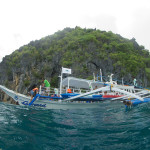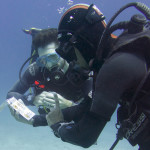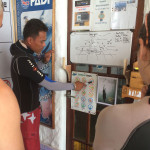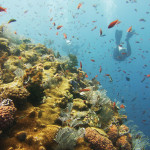By guest writer Samantha Craven, Project Manager, The Reef-World Foundation
Diving can open someone’s eyes to the beauty and fragility of the ocean ecosystem; the nature of the sport almost demands that we become more aware of major global issues like marine debris, coral bleaching and illegal fishing. And while the diving industry can represent an early-warning system for detrimental changes on the reefs, it can also cause significant damage to the very resource divers and dive shops rely on. Anchor damage, direct contact with coral and harsh cleaning products running onto beaches and into waterways are just a few of the threats diving can pose. While these impacts aren’t on the same scale as global threats like climate change, they do weaken the reef’s ability to withstand those bigger threats. “Reef resilience†is one of the latest catchphrases in marine conservation. Climate change is, without a doubt going to have a major impact on our reefs and, as divers, we can do our small parts to help slow this seemingly inexorable process. By following best practices, divers can significantly affect a coral reef’s resilience to these global threats.
What is Green Fins?
Green Fins, an initiative of the United Nations Environment Programme, provides the only internationally recognized environmental standards for the scuba-diving and snorkeling industry. It uses a unique three-pronged approach to marine conservation to enable these industries to become stewards for sustainable marine tourism.
Green certifications of dive shops
Over 400 operators across six Southeast Asian countries currently participate in this free membership program and have committed to improve their practices and protect coral reefs by following the Green Fins environmental code of conduct.
Members (operators) are supported by trained Green Fins assessors, who perform annual assessments to determine compliance with the code. This allows assessors and dive-shop managers to identify the biggest environmental threats in the area and come up with realistic solutions to put in place by the next year’s assessment. To maintain their Green Fins membership, dive shops must improve their environmental practices annually. By doing so, businesses in diving hotspots can drastically reduce the impacts of intensive reef diving by implementing solutions to everyday challenges.
From giving environmentally aware dive briefings to strictly enforcing a no-touch policy and installing effective garbage management, Green Fins provides a platform for businesses to share successful policies and access all the tools and materials they need to mitigate environmental threats and measure their improvement. Members that achieve the lowest environmental impacts will find themselves on the Green Fins Top 10 members list, making it easier for diving tourists to choose responsible operators.
“This is not some “over the counter†accreditation. Their trained staff assessed our dive shop and divemasters on actual dives and made suggestions on how we can improve.†– Savedra Dive Center, Moalboal, Philippines
Environmental education for dive staff
There are few dive guides around the world who are not intimately connected with the reefs that sustain their jobs; their passion and knowledge of their environment are part of what make reef diving such a successful industry. However, some guides feel pressure from management or their customers to allow bad behavior — touching or harassing marine life, touching coral — from their divers just to get that much-needed tip.
Along with the annual Green Fins operator assessment, the assessors provide training sessions for dive staff and boat crew. Staff learn about the importance of environmental standards, putting their extensive local knowledge about coral reefs in the bigger ecological picture. Assessors share tips and tricks for guides and boat crew to promote best practices to their customers, from giving environmental briefings and correcting damaging behavior, to sharing information about MPAs or the damage caused by anchors.
Dive staff are in a unique position to not only positively influence their peers and local communities, but also to teach divers fantastic lessons for low-impact diving, which they can use on future dive vacations. Next time you go diving, consider tipping your guide for their environmental positivity — and let them know you approve — as well as their customer service and you will go a long way to reinforcing that behavior.
“We make more money as a company by following good environmental practices. We get good feedback on TripAdvisor specifically because of this and therefore attract more customers.†– Evolution Diving Resort, Malapascua, Philippines
Strengthening regulations
No one understands the shortfalls of environmental laws in developing countries like the diving industry. Divers can hear the dynamite blasts, see the ghost nets, and will often be the first to notice that there’s no patrol at that marine protected area. Green Fins is managed in each country by a National Management Team made up of governmental bodies and often supported by national NGOs, so the program offers the diving industry a chance to directly voice these concerns to the decision makers in a neutral setting, and perhaps collaborate to come up with practical solutions.
On top of this, Green Fins is a useful tool for these government teams when it comes to strengthening regulations governing the marine-tourism industry. This provides even more support for businesses that want to improve their practices. Together, the assessments and strengthened regulations represent the bottom-up and top-down approaches, and when combined, reach that conservation sweet spot for effective change.
While many of the Green Fins activities occur behind the scenes and out of sight, tourists are in the perfect position to push this movement towards sustainable diving. Choose a dive center that enforces environmental standards and tell them that’s why you’re there. Compliment and tip your guide when they help you avoid damaging the reef, and make sure you never add to the marine debris and plastic pollution that plagues the oceans. When the demand is there for sustainable diving, the diving industry will be more than equipped to supply it and, as a diver, you have a pivotal role to play in this revolution.
U.K.-based charity The Reef-World Foundation has been working to inspire and empower people to conserve and sustainably develop coastal resources in Southeast Asia and the Indian Ocean for over 10 years. As the principle technical partner for the UNEP initiative, Green Fins, Reef-World has worked with national governments, the private sector and local communities to expand the initiative to six countries. To find out more about their work, please visit their website or like them on Facebook.
The post Green Fins: Diving in Symbiosis with the Reef appeared first on Scuba Diver Life.





